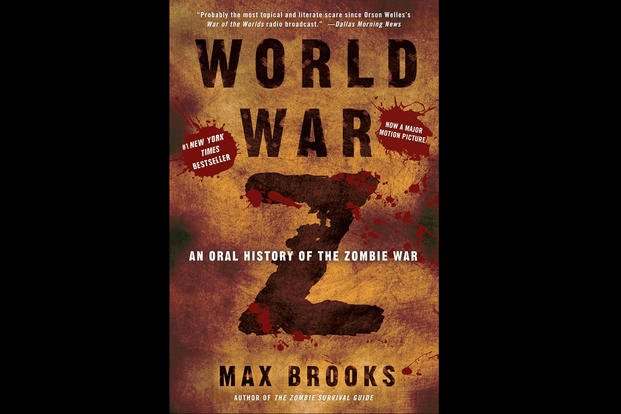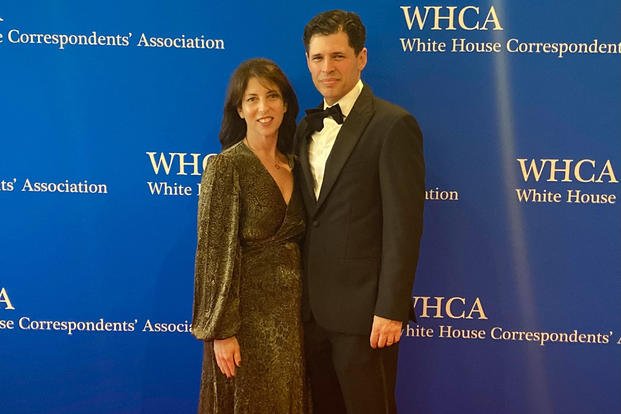As an Amazon associate, Military.com earns from qualifying purchases.
Max Brooks never expected the U.S. military to be so obsessed with the zombie apocalypse, let alone his vision of it.
The son of film legend Mel Brooks and actress Anne Bancroft, Max’s rise to fame came not from his parentage, but from his tale of a zombified world at war in his bestselling 2006 novel “World War Z: An Oral History of the Zombie War.” The novel, an epistolary work told from the perspectives of several individuals, examines a global zombie apocalypse like the type director and horror pioneer George Romero dreamed of in “Night of the Living Dead,” with world governments and militaries struggling to fight an onslaught of flesh-eating undead.
Written with military precision, the book sold a million copies in its first five years in print and precipitated a bidding war for the film rights between Leonardo DiCaprio and Brad Pitt (the latter won, with the movie adaptation premiering in 2013 and grossing more than half a billion dollars at the global box office).
But before it was a hit, selling “World War Z” proved a beast.
“People assumed ‘Mel Brooks Jr.’ was writing a spoof on zombies,” Brooks recently told Military.com of past potential publishers. “The man who gave us ‘Young Frankenstein’ is going to give us ‘Younger Frankenstein!’”
According to Max, his wife, Michelle Kholos Brooks -- a brilliant playwright in her own right -- saved the day. “She said, ‘You have to tell your side of the story and leave them behind,’” he recalled. His side? “‘World War Z’ came from a fear of zombies,” he said. “They scared the hell out of me.”
Max’s work caught the attention of the U.S. military, and to his amazement, he started hearing from military figures of all stripes. Past relatives had served in World War II -- comedian father Mel, most notably, was a combat engineer in the 1104 Engineer Combat Battalion, 78th Infantry Division -- but when it came to military affairs, “my association is different than my interest,” he says. Suddenly, however, he found himself a popular speaker at various military institutions on how people who put their lives on the line for their country could be better understood.
“The United States Naval War College wanted me to speak to a forum on emerging threats,” Max says. “I said, ‘You sure you’ve got the right guy’? The Atlantic Council [a nonpartisan think tank focused on international affairs] called to say they were combining artists and national security. What I talked about was storytelling. We are Hollywood, TV, we are the artistic capital of the world and we’re losing hearts and minds to a bunch of terrorists.” West Point’s Modern War Institute was formed to study all aspects of how people fight each other, “and they said they’d love for me to be a fellow! I’d never been a fellow of anything.”
While the U.S. military’s zombie fixation would eventually culminate with CONPLAN 8888 -- U.S. Strategic Command’s 2011 real-world “counter zombie dominance” contingency plan -- Max admits he learned about a lot more than just zombies in the course of his work with military leaders. “‘World War Z’ was how the world would survive such an attack, and it let me study military technology and national security and how different countries would handle such a situation,” he says.

While Brooks credits wife Michelle with helping him get “World War Z” out into the world, he credits his mother with the book’s oral history format. “She gave me the audiobook of ‘Working,’ read and written by Studs Terkel,” he told Military.com. Indeed, the book inspired Max to start writing famous actors to ask them to read parts for the audio version of “World War Z.” Among the positive responses were from F. Murray Abraham, Mark Hamill and Alan Alda. “My mom said don’t compliment people on their big commercial success: find something that was a passion project.” It worked.
Bancroft, one of America’s greatest actresses, put her career on hold at that time to help Max work through his challenges.
“My mom crafted a program for me to learn in school from the ground up,” he recalls. “Nothing was standard in the ’80s. You learn systems to cope. She took all of my books to change to audio. She fought for untimed tests as my brain took twice as long to translate. The problems are anxiety and low self-esteem that come with it. I learned to memorize or just know what I’m talking about. I have to rehearse over and over. I’m still seen walking the dog talking to myself.”
Michelle and Anne aren’t the only women Max credits with bringing “World War Z” to life: A lifetime dyslexic, he considers his preschool teacher, Jackie Weintraub, something of a savior.
“Max was a very active, wildly funny 4-year-old boy,” Weintraub told Military.com. “He would run around on the playground and in hopes of all adults looking his way, he would purposefully kick a trash can and hop on one foot, holding the self-inflicted injury. When Anne expressed concern that his handwriting was light-years away in legibility and his reading skills lagged, I reassured her about two things. One was not to worry about the handwriting -- he would be dictating to a secretary -- and two, as far as the reading, he would eventually read, but no one could tell a story like Max.”
While Max credits his wife with urging him to hang in during the perilous journey to get “World War Z” published, the couple also believes he’s repaid the favor in full by introducing her to the world of military affairs. The author of a previous play called “Hitler’s Tasters,” Michelle’s latest work is “War Words,” a very different kind of theatrical piece based on interviews with veterans of America’s 20-year-long war in Afghanistan and Iraq and their families -- a world she scarcely understood before her husband’s association with the U.S. military.
“I knew nothing about this world,” she says. ”I don’t like guns, fighting or war. Why can’t we all be nice to each other? But then, Max had just been to West Point and said, ‘Michelle, these are some of the most thoughtful and activated people I’ve ever come across.’ I said, ‘Someone should interview these people, put them on a stage in the style of ‘Vagina Monologues.’ Then, I realized, ‘Oh, yeah, I do that.’”
Michelle began “War Words” in 2019, putting out feelers for interviews with veterans of the Iraq and Afghanistan wars and their families. Her first question was always the same: Why did you join up? “I told them, ‘I’m probably the dumbest person you’ll ever meet,’ when it comes to [the] military,” she recalled.
Not unlike her husband, though in a different genre, she says she felt like a liaison between the military and civilians. “Some people have great stories but are not necessarily storytellers,” she says. Some of the most touching ones come from interpreters. “I had no idea about how important they are and those involved with urban warfare,” she says. “When Biden pulled troops out, it was very upsetting. They had warned the administration about not leaving brothers and sisters behind to die. They knew it was going to fall.”
“War Words” has had several dramatic readings, including on the warship Intrepid in New York. Now, it is rehearsing for a run off-Broadway, just in time for Veterans Day. This is simply actors on stage reading the actual words of soldiers, interpreters and homebound family members; Michelle says she’s learned as much as anyone about the complex experience of U.S. service members during America’s Forever Wars.
“We say we support our troops, but what does that really mean?” she asks. “No one signs up to get killed. We don’t know these people. They need our support and our passion when they come out.”
Of course, the couple’s concerns about these perilous times stretch beyond warfare. Michelle’s other new play is about gun safety, while Max has become the novelist responsible for interpreting Minecraft, the iconic video game.
“Minecraft is played by 130 million people worldwide,” Max says. “I agreed to write the first novel in order to highlight the life lessons the game can teach. That book taught you how to live with yourself, learning lessons about patience, planning and recovering from failure. Book 2 was about the lessons of friendship, communication, compromise and learning to work together. This final book is about how to live in a community, democracy, commerce, war and, as always, survival.”
But when it comes to warfare and the way we tell stories about it, Max and Michelle offer memories of the past and warnings of the future of warfare -- a future that, hopefully, won’t involve zombies.
Michele Willens is the author of “From Mouseketeers to Menopause.”
















